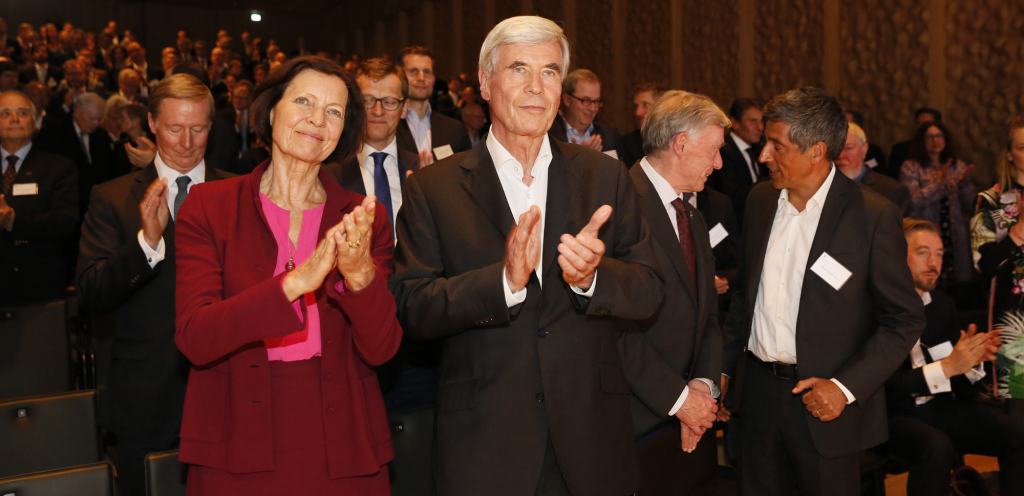
Dr. Michael Otto. Foto: Otto Group
Michael Otto did not want a big party for his 75th birthday. What he did want to do was talk about the issues that are important to him. That’s why the CEO of the Otto Group, Alexander Birken, used the occasion to organize a symposium entitled “future values”. Among the topics were sustainability and climate protection as well as the crisis of globalization, growing inequalities, the digitization of the economy and education issues. Around 400 guests attended lectures and took part in discussions and debates.
PIONEER IN THE FIELDS OF SUSTAINABILITY AND NATURE PROTECTION
Michael Otto is the chairman of the Otto Group, the second largest mail order company in the world. For many years he led the company, deeply enshrining within it the concept of sustainability not only in terms of practical application but also in the corporate culture. He also devoted significant efforts to issues of nature conservation and to a constructive, cooperative sustainability debate. He was one of the first executives to recognize the opportunities of digitization. His company has profited as a result and today stands as an example for the fact that sustainability and profitability do not have to be mutually exclusive.
So, how did Otto do it? While others remain reluctant when it comes to new environmental and social standards and policies, Michael Otto is the opposite. As the initiator of the 2 Grad foundation he has brought together a group of entrepreneurs who want to support climate protection. Within his own company, he set up a supplier auditing system when hardly anyone gave any consideration to such ideas. In the 1990s, he initiated the Elbe dialogue between politicians and NGOs, whose nature-friendly policies have since been transformed into political action. With his Michael Otto Foundation, he promotes large-scale projects for the protection of rivers. And whatever he does he will do the Hanseatic way: quiet, prudent and cooperative.
BETTER THAN WE THINK
What does the term future values stand for in a rapidly changing world?
Some highlights of the speakers:
For several decades the economist, Peter Bofinger, has been pursuing the question of whether digitization will create employment or destroy it. His conclusion: “We are better than we think. Never before has there been so much employment as there is now, in spite of digitization. The guiding principle must be prosperity for all and we have to invest a lot in education and training.” But, adds Bofinger, the market also needs limits.
The former Member of the German Parliament, Ernst-Ulrich von Weizsaecker, hopes that the “new enlightenment” can help bring about more balance while at the same time doing away with dogmatism. There currently is a global economy that is bound by national legal frameworks, he says. That model however is no longer working. Von Weizsaecker therefore is calling for more international conventions and agreements such as the G20. The German model, he says, could help during the transition phase, because there are many family businesses that think long term as opposed to public companies, which only work with quarterly results.
The question of whether democracy is still the most appropriate form of government was also discussed. One often-cited weakness of democracy is that decision-making processes take a long time and often only end in compromises. Von Weizsaecker is not ready to accept this aspect as a disadvantage. Good decisions, he believes, often require time, as opposed to fast “Fake News”. Democracy is a helpful means of slowing things down. China without democracy, von Weizsaecker says, is nothing but a digitized nightmare.
UNCONDITIONAL BASIC INCOME
The speakers at the symposium also discussed the question of whether an unconditional basic income could pose a solution in the event that scores of jobs were lost to digitization – which has not yet been well enough established.
Interestingly, the ‘captains’ of some digital companies support a basic income. At the same time the economist Bofinger and the politician von Weizsaecker were rather hesitant in their answers: von Weizsaecker believes that performance-based pay is a positive incentive, but that there must be political efforts to ensure that fairness and performance incentives remain balanced. Bofinger brought into play reductions in working hours as a possible response to digitization.
Overall, it was clear: It’s not just the values of the future, which were being discussed during the symposium. There were also questions of the present. Politically, the course must be set now in order to address the growing uncertainty in society that’s being caused by automation and digitization. Apart from the transformation of the economy towards sustainability and comprehensive quality, the most important task facing German and international politics today therefore is to ensure that this transition will takes place in a humane way.
 Monika Griefahn GmbH
Monika Griefahn GmbH
Leave a Reply